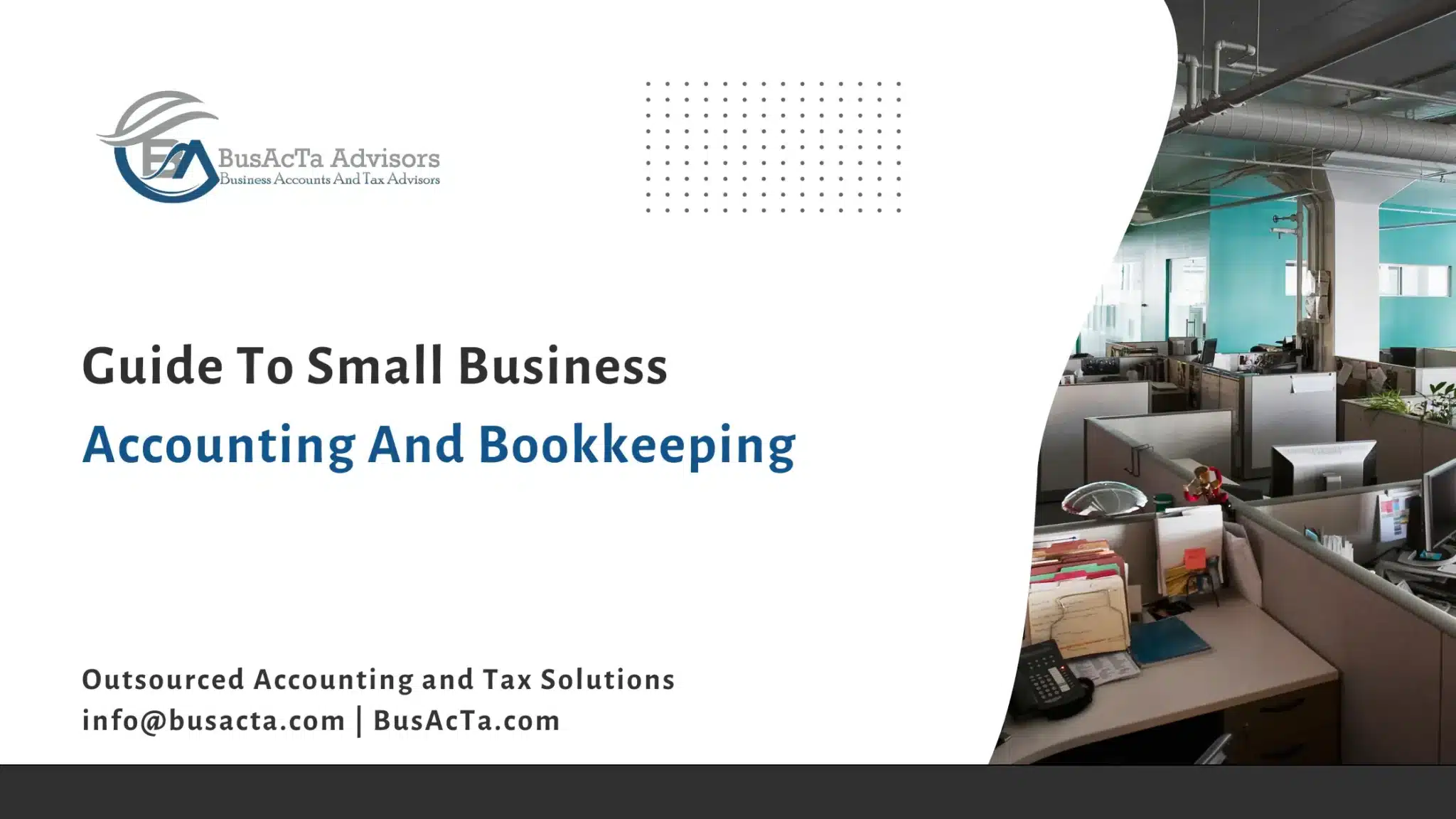Understanding the basics
Small business accounting and bookkeeping can often feel like a daunting task, especially when you’re trying to juggle all the other aspects of running your business. However, with the right approach and tools, it can be more manageable than you might think.
In this comprehensive guide, we’ll walk you through everything you need to know about small business accounting and bookkeeping, from the fundamental principles to advanced strategies.
What is small business accounting?
Accounting, on the other hand, takes the information gathered through bookkeeping and uses it to:
- Setting up your accounting system
- Tracking income and expenses
- Managing cash flow
- Creating financial statements
- Tax planning and compliance
- Budgeting and forecasting
- Choosing the right accounting software
Accounting is about interpreting the financial data to gain insights into your business’s financial health and make informed decisions about its future.
What is small business bookkeeping?
Bookkeeping is the foundation of your business’s financial record-keeping. It involves:
- Accurate record-keeping
- Regular bank reconciliation
- Proper expense tracking
- Timely invoicing
- Cash flow management
- Financial reporting
- Tax compliance
Essentially, bookkeeping is about capturing the raw financial data of your business. It’s the process of systematically recording all financial transactions to create a clear picture of your business’s day-to-day operations.
Small business bookkeeping vs accounting
It’s common for small business owners to feel overwhelmed when it comes to managing their finances. The terms ‘bookkeeping’ and ‘accounting’ are often used interchangeably, but they’re actually two distinct processes that play crucial roles in your business’s financial health.
In this guide, we’ll explore the key differences between small business bookkeeping and accounting, helping you understand which one you need and when.
Key differences between bookkeeping and accounting
1. Focus and purpose
Bookkeeping focuses on recording and organising financial data, while accounting focuses on interpreting and analysing that data.
2. Timing
Bookkeeping is an ongoing process that happens daily or weekly, whereas accounting typically occurs monthly, quarterly, or annually.
3. Skills required
Bookkeeping requires attention to detail and basic math skills. Accounting requires more advanced analytical skills and a deeper understanding of financial principles.
4. Reporting
Bookkeepers produce simple financial reports like profit and loss statements. Accountants create more complex reports like balance sheets and cash flow statements.
5. Decision-making role
Bookkeeping provides the raw data needed for decision-making. Accounting uses this data to offer strategic financial advice.
Key components of small business accounting
- Setting up your accounting system
- Tracking income and expenses
- Managing cash flow
- Creating financial statements
- Tax planning and compliance
- Budgeting and forecasting
- Choosing the right accounting software
Let’s dive deeper into each of these components to give you a clear understanding of how to master your small business accounting.
1. Setting up your accounting system
The foundation of good accounting practices starts with setting up a robust system. This involves:
- Choosing between cash or accrual accounting methods
- Setting up a chart of accounts
- Establishing a filing system for financial documents
- Separating personal and business finances
By getting these basics right from the start, you’ll save yourself a lot of headaches down the road.
2. Tracking income and expenses
Accurate record-keeping is crucial for any business. Here’s what you need to do:
- Record all transactions, no matter how small
- Categorise expenses correctly
- Keep receipts and invoices organised
- Reconcile your accounts regularly
Remember, the more detailed and organised your records are, the easier it will be to manage your finances and prepare for tax time.
3. Managing cash flow
Cash flow is the lifeblood of any business. To manage it effectively:
- Create and maintain a cash flow forecast
- Monitor accounts receivable and payable
- Establish clear payment terms for customers
- Consider offering discounts for early payments
By staying on top of your cash flow, you’ll be better equipped to handle any financial challenges that come your way.
4. Creating financial statements
Financial statements provide a snapshot of your business’s financial health. The three main statements you should be familiar with are:
- Balance sheet
- Income statement (profit and loss statement)
- Cash flow statement
These documents not only help you understand your business’s performance but are also essential for securing loans or attracting investors.
5. Tax planning and compliance
Staying compliant with tax regulations is crucial for any small business. Here’s what you need to do:
- Understand your tax obligations
- Keep accurate records for tax purposes
- Set aside money for tax payments
- Consider working with a tax professional
Remember, tax laws can change, so it’s important to stay informed about any updates that might affect your business.
6. Budgeting and forecasting
Creating a budget and financial forecast can help you make informed decisions about your business’s future. This involves:
- Setting financial goals
- Estimating future income and expenses
- Regularly reviewing and adjusting your budget
- Using forecasts to plan for growth or potential downturns
By having a clear financial roadmap, you’ll be better prepared to navigate the ups and downs of running a small business.
7. Choosing the right accounting software
In today’s digital age, using accounting software can streamline your bookkeeping processes and save you valuable time. When selecting software, consider:
- Your business’s specific needs
- Ease of use
- Integration with other tools you use
- Cost and scalability
- Cloud-based vs desktop options
Many small businesses find that cloud-based accounting software offers the flexibility and features they need to manage their finances effectively.
Key Components of Small Business Bookkeeping
In the ever-evolving landscape of small business management, bookkeeping remains a cornerstone of financial stability and growth. While it might seem daunting at first, understanding the key components of small business bookkeeping can make this essential task more manageable and even empowering.
Let’s dive into the crucial elements that form the backbone of effective small business bookkeeping:
- Accurate record-keeping
- Regular bank reconciliation
- Proper expense tracking
- Timely invoicing
- Cash flow management
- Financial reporting
- Tax compliance
1. Accurate record-keeping
At its core, bookkeeping is about maintaining precise records of all financial transactions. This means documenting every penny that enters or leaves your business. Here’s what you need to do:
- Record all sales and income
- Keep track of all expenses, no matter how small
- Maintain organized records of receipts and invoices
- Use cloud accounting software for real-time updates and easy access
Remember, accurate record-keeping isn’t just about satisfying HMRC requirements—it’s about giving you a clear picture of your business’s financial health.
2. Regular bank reconciliation
Bank reconciliation is the process of matching your recorded transactions with your bank statements. This crucial step helps you:
- Identify discrepancies or errors
- Detect fraudulent activities
- Ensure all transactions are accounted for
Make it a habit to reconcile your accounts at least monthly. Many cloud accounting platforms offer automated reconciliation features, making this task quicker and more accurate.
3. Proper expense tracking
Tracking your business expenses is vital for managing your cash flow and maximizing tax deductions. Here’s how to do it effectively:
- Categorize expenses correctly (e.g., office supplies, travel, utilities)
- Keep digital copies of all receipts
- Use expense tracking apps for real-time recording
By staying on top of your expenses, you’ll have a clearer understanding of your business’s spending patterns and areas where you might be able to cut costs.
4. Timely invoicing
Prompt and accurate invoicing is crucial for maintaining healthy cash flow. Here are some best practices:
- Issue invoices immediately after delivering goods or services
- Clearly state payment terms on each invoice
- Use automated invoicing features in your accounting software
- Follow up on overdue payments promptly
Remember, the quicker you invoice, the sooner you’re likely to get paid.
5. Cash flow management
Understanding and managing your cash flow is vital for small business success. This involves:
- Monitoring incoming and outgoing cash
- Forecasting future cash needs
- Maintaining a cash reserve for unexpected expenses
- Negotiating favorable payment terms with suppliers
Effective cash flow management ensures you have the funds to cover your expenses and invest in growth opportunities.
6. Financial reporting
Regular financial reporting provides valuable insights into your business’s performance. Key reports include:
- Profit and Loss Statement
- Balance Sheet
- Cash Flow Statement
These reports help you track your business’s financial health, identify trends, and make informed decisions about future strategies.
7. Tax compliance
Staying compliant with tax preparation regulations is a critical aspect of small business bookkeeping. This involves:
- Keeping accurate records for VAT returns (if applicable)
- Setting aside money for tax payments
- Understanding and adhering to relevant tax deadlines
- Staying informed about changes in tax legislation
Consider using accounting software that automatically calculates your tax liabilities and reminds you of important deadlines.
While mastering these key components of small business bookkeeping may seem challenging at first, they become more manageable with practice and the right tools. Remember, effective bookkeeping isn’t just about meeting legal obligations—it’s about empowering you to make informed decisions that drive your business forward.
By focusing on these essential elements, you’ll be well on your way to maintaining robust financial records that support your business’s growth and success. And if you find yourself overwhelmed, don’t hesitate to seek professional help from a qualified accountant or bookkeeper.
Small Business Accounting Software: Pros and Cons
Small business owners often find themselves at a crossroads when it comes to managing their finances. Small Business Accounting software offers a modern solution to this age-old challenge. These digital tools streamline financial processes, making them more efficient than traditional manual methods.
Most accounting software packages come equipped with features that automate data entry, perform complex calculations, and generate detailed financial reports. Once you’ve input your initial data, the software takes care of the rest, ensuring accuracy and saving valuable time during tax season.
Advanced versions of these applications often integrate seamlessly with other business management tools. They can track inventory, manage payroll, and even provide insights into business performance through trend analysis. The ability to store vast amounts of financial data digitally also enhances accessibility, allowing quick retrieval of important information like transaction histories.
Software Advantages
- Automated data entry reduces human error
- Built-in tax calculation features
- Cloud-based options eliminate the need for expensive on-site hardware
- Intuitive user interfaces designed for non-accountants
Software Disadvantages
- Increased security risks with cloud-based solutions
- Often require annual subscriptions for updates and support
- Reliance on external technical support
- Can be costly, especially for comprehensive desktop versions
Some accounting software is designed with professional accountants in mind, while others cater to business owners looking to handle their own finances. The choice largely depends on the complexity of your business and your level of accounting expertise.
Basic accounting software – sometimes available for free or at a low cost – can be sufficient for small businesses with minimal inventory and few employees. While these simpler options are easy to implement, they may not offer the depth of features needed to ensure complete accuracy in financial reporting, potentially increasing the risk of an IRS audit.
Popular accounting programs for small businesses include:
QuickBooks Online: A leading cloud-based accounting software offering a wide range of features, including invoicing, expense tracking, and payroll.

Xero: Another popular choice known for its user-friendly interface and integration capabilities.
FreshBooks: Designed specifically for freelancers and small businesses, offering simple invoicing and time tracking.
Zoho Books: A comprehensive accounting software with features like inventory management and expense reporting.
Wave: A free accounting software with premium features available for a fee.
Final thoughts
While small business accounting and bookkeeping may seem overwhelming at first, breaking it down into manageable tasks can make it much more approachable. By following the steps outlined in this guide and staying organised, you’ll be well on your way to mastering your business finances.
Remember, if you ever feel out of your depth, don’t hesitate to seek help from a professional accountant or bookkeeper. Their expertise can be invaluable in ensuring your business’s financial health and compliance.
Contact BusAcTa Advisors today to schedule a free consultation and discover how our outsourced tax preparation services can help you run your business more efficiently and provide better client service.





